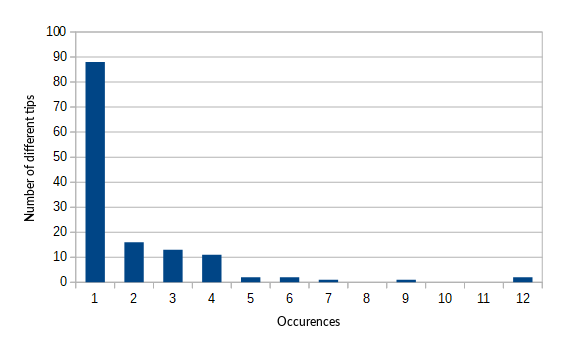A meta-analysis of production advice from the internet
Lot of tips and tricks are given on the Internet. Those related to the difficult art of being an electronic music producer are particularly plentiful. In this article, we cluster those pieces of advice to highlight the most frequent ones. Reading time: 3 min.
Methodology
We took 9 blog articles (see below) and enumerated their contained pieces of advice. This gave a population of 265 tips total, amongst which 136 different ones.
Some informal rules emerged as soon as a classification was attempted:
- No weighting. An article with 5 tips would weight less that an article with 50.
- Subjective clusters. Pieces of advice were merged when the underlying theme was the same but the form different.
- Multiplicity. Likewise, if several advice were teamed up in a single piece of advice, split them.
Also: some advice deemed too specific were removed (e.g: "record drums like this").

Results: Some tips are, without too much surprise, more common than others. The top 6 pieces of advice are particularly successful, occurring at least 6 times out of 265 each (>= 2.2% of total).
Top 6 tips
Tip #1: Limit amount of tools (4.5% of total advice)

Forms:
- "Limit amount of tools",
- "Do the best with what you have",
- "No one cares what DAW you use"…
The most common piece of advice insists on a low number of different tools.
The underlying narrative seems to be that "learning mode is not creating mode". One should spend most of the creative time creating, in a comfortable mental state with known tools.
(For us, sellers of such tools, this isn't such good news. Indeed it is known in musical circles that chaseing the newest plug-ins can be detrimental to music-making. As plug-in developers, it is our responsibility to make tools that can be integrated quickly into a workflow, with low mental overhead.)
Tip #2: "Do your own thing" (4.5% of total advice)

Forms:
- "Do your own thing",
- "Have your own sound",
- "Don't compare to others",
- "Make music you want to listen to",
- "Don't follow trends"…
An equally large amount of tips insist upon making music without an external frame of reference.
The subtexts refers to associated risks like:
- Being too much concerned about external approval,
- Being not unique enough,
- Being discouraged by perceived technical perfection…
So a good way to avoid these risks is supposedly to avoid external references.
It is interesting because quite a number of others tips were saying the opposite: "study commercial material, existing presets, existing drum loops, reference tracks..." but still doesn't amount to as much points.
Tip #3: "Be interested in your craft" (3.4% of total advice)

Forms:
- "Be interested in your craft",
- "Study technique",
- "Invest in your technical skill"…
The 3rd most common advice is to get interested in the technical aspect of production.
While this may seem self-evident, we think the underlying message is: "Allocate more attention to production, more neurons". Is production a small or large part of your inner life?
Tip #4: "Continue doing it" (2.6% of total advice)

Forms:
- "Don't give up",
- "Keep working on it and you'll be a pro",
- "You're making progress even if it doesn't feel like it"…
The next most frequent piece of advice is simply to not stop music production and let time makes its effect. It takes a lot of time to be an expert in anything, there would be no shortcut.
It is worth pointing out that the "work hard"/"be driven" piece of advice is only about 0.75% of the total tips. If such advice were to represent reality, that would mean "Don't give up" is 3.5x more important than "Work hard".
Tip #5 "Less is more" (2.2% of total advice)

Forms:
- "Use silence",
- "Allow space",
- "Less is more",
- "Decide what is important",
- "Have less tracks going at once"…
The next most frequent piece of advice is to have less things going at once.
In a way this is the same mindset that underlies Tip #1, but this one specifically refers to silence in a mix, not limited tooling.
Tip #6 "Keep an open mind" (2.2% of total advice)

Forms:
- "Keep an open mind",
- "Make new experiences",
- "Keep things fresh",
- "Embrace change"…
The next tip is about keeping an "open mind", or to do things that may lead to a more "open mind".
We think this may refer to a high Openness to Experience as defined by the Big Five personality model.
Are advice lists useful?
Well, take this article with a giant grain of salt (a salt block).
Nothing says that:
- reading advice changes actual behaviour,
- most frequent advice are inherently more relevant.
As someone who doesn't produce well (I failed to follow Tip #4 years ago) I'm not able to judge the relevance of such analysis. On the other hand, if you replace some words, this list seems to apply to computer programming very well. So maybe there is more to it.
Data-set
Here is the content aggregated for this article:
- 50 production secrets from the pros
- 15 Music Production Tips from Producers Who’ve Changed the Game
- Advice for young producers
- 72 Music Production Tips I Wish I Knew When I Started
- 121 Music Production Tips from the Experts
- 11 Essential Music Production Tips For Advanced Beginner Producers Who Want To Crush It
- 5 Crucial Skills Every Producer Needs to Master
- Becoming a Music Producer: Advice, Guidance, Tips & Tricks
- 5 Essential Tips for Becoming a Successful Music Producer
